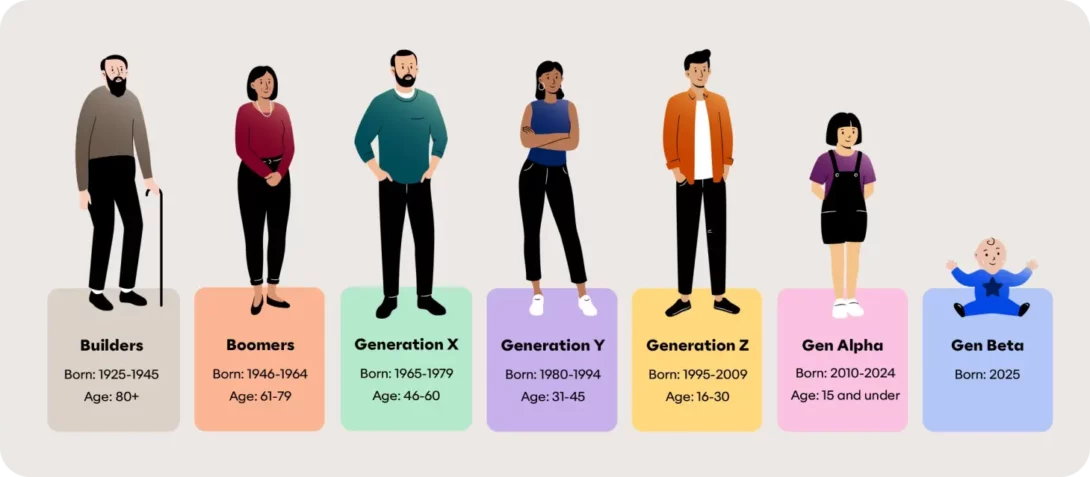Generation Names: A Complete Guide to Understanding Each Era
Why Generation Names Matter
Everywhere you look, people talk about Millennials, Gen Z, or Boomers. These labels, known as generation names, are more than just trendy buzzwords. They represent groups of people born in specific time periods who often share similar experiences, values, and cultural influences.
From the Silent Generation to Gen Alpha, each group has unique traits shaped by history, technology, and society. Knowing these generation names helps us better understand cultural differences, workplace habits, and even consumer behavior.
In this article, we’ll dive deep into the timeline of generation names, their defining characteristics, and why they matter today.
What Are Generation Names?
Generation names are labels given to groups of people born within a certain time frame, usually spanning 15–20 years. These names help categorize large populations based on shared historical events, cultural shifts, and technological changes.
For example:
People born after World War II are often called Baby Boomers because of the population “boom” during that era.
Today’s youngest kids are part of Gen Alpha, growing up in a fully digital world.
These labels aren’t perfect, but they’re useful for spotting trends across age groups.
The Main Generation Names and Their Timeline
Here’s a breakdown of the most commonly recognized generation names in the U.S. and many other parts of the world.
The Silent Generation (1928–1945)
Nickname: Traditionalists
Key Events: Great Depression, World War II, early Cold War
Traits: Hardworking, disciplined, loyal, cautious with money
Why the Name? They were called “silent” because they grew up during difficult times, often prioritizing duty and stability over self-expression.
Baby Boomers (1946–1964)
Key Events: Post-WWII economic boom, Civil Rights Movement, Vietnam War
Traits: Competitive, optimistic, career-focused, value personal fulfillment
Why the Name? This generation got its name from the “baby boom” after WWII, when birth rates skyrocketed.
Generation X (1965–1980)
Nickname: The “Latchkey Generation”
Key Events: Cold War tensions, MTV culture, rise of personal computers
Traits: Independent, resourceful, skeptical, work-life balance seekers
Why the Name? The term “X” symbolized an unknown identity—this group didn’t quite fit the mold of Boomers or Millennials.
Millennials / Generation Y (1981–1996)
Key Events: 9/11 attacks, rise of the internet, Great Recession
Traits: Tech-savvy, collaborative, socially conscious, value experiences over material things
Why the Name? Born around the turn of the millennium, they were the first to grow up with computers and the internet.
Generation Z (1997–2012)
Nicknames: Zoomers, Digital Natives
Key Events: Social media explosion, smartphones, climate change activism, COVID-19 pandemic
Traits: Progressive, entrepreneurial, diverse, short attention spans due to digital habits
Why the Name? They follow Generation Y (Millennials) and represent the next wave—“Z” signaling the end of the alphabet.
Generation Alpha (2013–present)
Key Events: AI growth, streaming culture, global connectivity, climate awareness
Traits: Extremely tech-driven, creative, highly educated, influenced by digital learning
Why the Name? Instead of continuing with “Gen Beta,” researchers reset the cycle with the Greek alphabet, starting at “Alpha.”
Comparison Table of Generation Names
| Generation | Years Born | Defining Traits | Key Events |
|---|---|---|---|
| Silent Generation | 1928–1945 | Duty, discipline, frugality | WWII, Great Depression |
| Baby Boomers | 1946–1964 | Optimism, ambition, competitiveness | Post-war boom, Civil Rights |
| Generation X | 1965–1980 | Independence, adaptability | Cold War, rise of PCs |
| Millennials (Gen Y) | 1981–1996 | Tech-savvy, collaborative | Internet, 9/11, Recession |
| Generation Z | 1997–2012 | Digital natives, diversity | Social media, smartphones |
| Generation Alpha | 2013–present | Hyper-connected, creative | AI, global digitalization |
Why Generation Names Are Important
Understanding generation names helps in many areas of life:
In the Workplace
Boomers often value loyalty and hierarchy.
Gen X prefers flexibility and independence.
Millennials and Gen Z prioritize purpose and work-life balance.
Employers use these insights to improve teamwork and retention.
In Marketing
Boomers respond well to traditional ads.
Millennials prefer experiences and brand authenticity.
Gen Z values short, creative, and socially conscious campaigns.
In Society
Generational differences shape politics, education, technology use, and even family dynamics. Recognizing these patterns helps reduce misunderstandings between age groups.
Common Misconceptions About Generation Names
They’re universal everywhere.
Not all countries use the same labels. For example, “Boomers” may not apply in regions where birth rates didn’t spike post-WWII.
Everyone fits their generation’s stereotype.
While patterns exist, individual experiences vary widely. A Millennial in the U.S. may have very different values from one in Asia.
Generations have hard start and end dates.
These are rough ranges, not exact science. People born near the “edges” often share traits of both generations.
The Future of Generation Names
After Gen Alpha, the next group may be called Generation Beta, continuing the Greek alphabet. Researchers expect these kids to grow up in a world dominated by AI, space exploration, and advanced sustainability practices.
It’s fascinating to think that in a few decades, today’s “youngest generation” will shape global culture in ways we can’t fully imagine yet.
Final Thoughts
Generation names give us a simple way to understand history, culture, and human behavior. From the Silent Generation to Gen Alpha, each group reflects the events and technologies that shaped their world.
While not everyone fits their generational stereotype, these categories help us make sense of big societal changes.
As we look ahead, new generation names will continue to emerge, carrying with them the stories of tomorrow’s world.
Call to Action:
Which generation do you belong to, and how do you think it shaped your values? Reflect on your generational traits and how they impact your daily life—you might discover new insights about yourself and others.









Post Comment